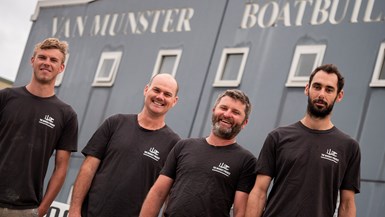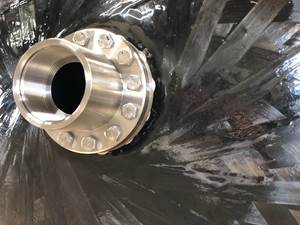ATL Composites contributes to carbon fiber composite powerboat hull
Whiskey Alpha eight five is a recently introduced powerboat featuring a carbon fiber composite hull, developed for low weight and high speed.

Whiskey Alpha eight five powerboat. Source | ATL Composites
At the Pacific 2019 Expo in Sydney, Australia, a consortium of companies called “The Whiskey Project” introduced its first boat: Whiskey Alpha eight five, a high-performance powerboat featuring an advanced carbon fiber composite hull.
The boat, called the first “Next Generation Tactical Watercraft,” was built by Van Munster Boats (Morisset, Australia), working in collaboration with ATL Composites (Molendinar, Australia), along with the lead architect from Farr Yachts, marine composites engineer and America’s Cup winner Brett Ellis, and computational fluid dynamics (CFD) system and hull specialists from research institute Navatek Hawaii.
Whiskey Alpha eight five is 8.5 meters long, but is said to be scalable from 6 to 12 meters. Its advanced carbon fiber composite hull, called “Sea Blade,” is said to provide greater strength to weight than traditional aluminum or FRP hulls made from other materials.
The hull form is the product of a decade of research and development, with the goal of designing a watercraft that provides greater stability while achieving higher average speed than a comparable deep-V hull.
“The co-founders of The Whiskey Project commissioned the design based on their 20 years’ defense experience as tactical maritime operators, and they intimately understood what the capability gaps were in the existing craft being used globally,” says Brett Van Munster from Van Munster Boats. “They knew the current boats were simply not fit for purpose. … Operators need watercraft that offered a higher level of seakeeping and safety but also high-speed offshore capability in all sea states, as well as low speed maneuvering for the boarding, recovery or disembarking of ships.”

Source | ATL Composites
Van Munster boats, established in 1988, is a second-generation family-owned and run business that has earned a reputation for innovative custom builds, including composite construction. The company’s main business focuses on 18- and 16-foot skiffs, for which it has been the international Class builder for the past 14 years,
Van Munster Boats and ATL Composites’ partnership goes back two decades through a range of projects. For the Whiskey Project, ATL Composites supplied Divinycell foam core to deliver the high strength structure required in such extreme operating conditions, and fast speeds, and custom DuFLEX panels for deck, cockpit and internal framing. ATL CNC machined components to the uniquely engineered requirements.
“One of the key challenges that always arise on tight time frames is material procurement. Fortunately, we have good suppliers such as ATL that we can rely on to deliver,” says Van Munster.
According to ATL Composites, the efforts paid off, and Whiskey Alpha eight five was the center of attention at Pacific 2019, the biennial international maritime expo that took place Oct. 8-10, 2019.
“There has been huge interest following the event from both domestic and international defense delegations … and we are looking forward to the next phase of The Whiskey Project,” says Van Munster.
The “Whiskey” nomenclature for the project is derived from the NATO phonetic alphabet, where “W” denotes the military water operators and “Whiskey” is their callsign.
Related Content
Revisiting the OceanGate Titan disaster
A year has passed since the tragic loss of the Titan submersible that claimed the lives of five people. What lessons have been learned from the disaster?
Read MoreInfinite Composites: Type V tanks for space, hydrogen, automotive and more
After a decade of proving its linerless, weight-saving composite tanks with NASA and more than 30 aerospace companies, this CryoSphere pioneer is scaling for growth in commercial space and sustainable transportation on Earth.
Read MoreLow-cost, efficient CFRP anisogrid lattice structures
CIRA uses patented parallel winding, dry fiber, silicone tooling and resin infusion to cut labor for lightweight, heavily loaded space applications.
Read MoreCarbon fiber composite pallet revolutionizes freight industry
LOG Point Pallet fuses advanced materials with innovative design and manufacturing to improve supply chains worldwide.
Read MoreRead Next
Ceramic matrix composites: Faster, cheaper, higher temperature
New players proliferate, increasing CMC materials and manufacturing capacity, novel processes and automation to meet demand for higher part volumes and performance.
Read MoreScaling up, optimizing the flax fiber composite camper
Greenlander’s Sherpa RV cab, which is largely constructed from flax fiber/bio-epoxy sandwich panels, nears commercial production readiness and next-generation scale-up.
Read MoreUltrasonic welding for in-space manufacturing of CFRTP
Agile Ultrasonics and NASA trial robotic-compatible carbon fiber-reinforced thermoplastic ultrasonic welding technology for space structures.
Read More.jpg;width=70;height=70;mode=crop)












